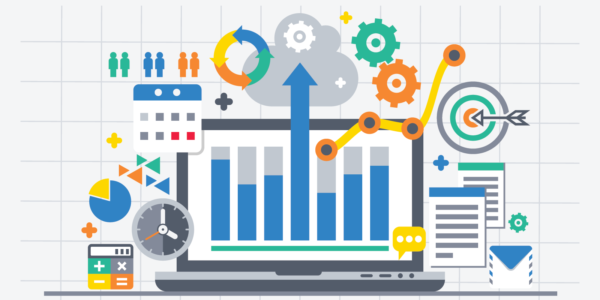How to Use Analytics to Ramp Up Your Sales

Managing sales doesn’t have to be a guessing game. To get a clearer picture of how a sales strategy is performing – and where future sales will come from – analyze what’s worked in the past and then tweak the heck out of it.
Analytics allow businesses to monitor customer activities and link them to specific sales efforts. So many organizations are now using analytics to boost sales and marketing, meaning companies that fail to adopt analytics technology will eventually find themselves losing to competition.
One challenge businesses face in adopting analytics technology is maneuvering through all the hype. But let’s start with this: The reality is that many companies just don’t have data-driven business practices. This may be because their data is dispersed across many sources or, if businesses attempt to gather their data, it’s often not integrated and consolidated into a central location. In other words, they don’t have a complete view of the data – and that makes it virtually impossible for them to get a single, clear, accurate, data-driven view to help drive action across the business.
Complicating matters is that many stakeholders often receive their data too late – prohibiting them from making decisions as needed. And those who receive their data on time may find it hard to interpret and understand.
Despite these challenges, organizations have a compelling need to operationalize their analytics to drive value. Analytics data can support better decision making and management in key sales areas such as sales performance, forecasting, territories, accounts, channels, and sales pipeline.
As in any business area, the two complementary aspects of “managing it” and “doing it” are relevant. Here are several ways businesses can supercharge their sales by using business analytics.
Sales Team Management: Identify Patterns and Drive a Results-Oriented Team
Businesses can analyze behavioral patterns of opportunities derived from the sales funnel. This will help sales managers, account managers, and sales teams understand the successful techniques and actions that should produce desired results.
The software for sales analytics, including CRM, contain a range of data that allows this type of evaluation, such as lead scoring and opportunity scoring. The analysis should yield specific actions in the sales process to help the business drive its sales coaching and training practices.
The insights from analyzing sales data can answer important questions like:
- Which sales reps are struggling to identify all the buying influences?
- How do we assign sales reps clear and balanced territories and adjust as needed?
Answering these questions can help a company identify specific actions to achieve successful outcomes or identify how to guide the team.
To discuss this further, sales analytics will point out whether an individual representative’s list of contacts includes mainly those in technical roles. If so, this could suggest that the representative must work on identifying other buying influences to engage prospects in the sales process earlier. Simply put, it determines the reliability of the data, along with the identification of trends to lead to desired results.
Sales Effort Effectiveness: Inform Data into Everyday Sales Activities
Every company operates its sales team differently. A one-off product company does not have the same requirements as a company based on a recurring-revenue model. However, both companies depend on their sales to reach revenues and profitability targets.
In addition to using insights from historical data to improve a sales team, companies can provide guidance to sales professionals to improve their chances of making a sale. This can include strategic suggestions for a market or an account in a specific vertical where demand for a certain product is higher than others. It might include tactical ideas like product bundling, up-selling, or cross-selling products that have sold well historically when offered together.
Consider that a salesperson might very well make more than a hundred calls a day. Using data analytics can be very valuable for deal scoring as well as determining which opportunities are worth picking up – and which should be allocated to marketing nurture campaigns. The perception that specific calls would be more productive and successful will increase confidence and lead to better customer interaction to close the deal.
Sales analytics can also be useful for personal interactions. For instance, sales professionals can use data to address pricing questions on the spot. The sales reps can gain tremendous credibility by showing average prices of recent sales for companies located in the current prospect’s region, vertical, or company size – often on a mobile device during the meeting. Such data types and analytic benchmarks allow salespeople to understand how their customers pay attention to pricing and how flexible and elastic they are in accommodating discounts.
To get started, businesses should identify specific informational needs to support sales. They can evaluate their data sources, data quality, and technical infrastructure. From here, they can pinpoint gaps and areas needing improvement and develop a strategy and broad-based roadmap.
Closing Thoughts to Close the Sale
In sales-oriented organizations, the role of data is shifting away from management reporting and toward the development of a strategic tool for sales managers and sales teams. Nonetheless, this change requires overcoming the initial resistance to data quality and reliability barriers when trying to secure organizational buy-in.
With analytics as a motivator and incentive, the organization can ensure that sales managers and representatives are in control of their achievements. The organization can build a highly effective sales team that is capable of prioritizing, taking ownership, and making solid choices – all derived from using analytics data as a strategic tool to drive revenue and profits.
Manish Godha is founder and CEO of Advaiya, a technology consulting and implementation services company that provides tailored digital transformation solutions with business applications and analytics.
Get our Enewsletter
Get the latest sales leadership insight, strategies, and best practices delivered weekly to your inbox.
Sign up NOW →